Is it possible to feed birds rice and other grains?
From an early age, parents try to instill in their children a wonderful trait - love and the desire to come to the aid of our smaller brothers. The simplest step in this matter is to build a simple feeder and treat the birds from time to time. However, do adults themselves know how to properly provide this assistance so as not to harm the birds? Let's look at this interesting and at the same time difficult issue.
Is it possible to feed rice to birds in bird feeders?
One of the budget products that is found in almost every home is cereal. Most often, this is what birds are fed with. But Is every grain good for them? After all, when doing good, it is important to follow a number of rules and take into account the peculiarities of the life activities of the wards.
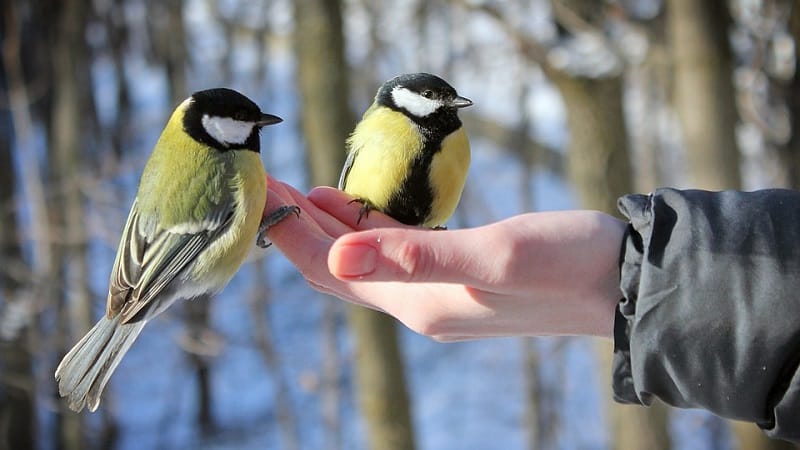
Is it possible to give raw/cooked rice?
Many ornithologists notice that rice is most often found in street feeders. Raw or heat-treated. Do birds eat it? Yes, but This is absolutely not allowed! Rice tends to swell from moisture. Once in a bird's tiny stomach, the grains can cause her suffering.
Is it possible to put other cereals in the feeder?
Other common grains, such as buckwheat and pearl barley, are also dangerous for birds.. They have similar properties to rice and expand in a humid environment. Oatmeal and millet (unrefined millet) are considered harmless. They are sold in all pet stores.
Note! Millet is part of a special cereal mixture for birds.
What is the best way to feed birds in bird feeders?
Specialists it is recommended to buy food rich in vegetable fat, for example, rapeseed and flax. More budget-friendly options include raw, clean sunflower seeds (seeds). The birds will eat them without leaving a trace and will be satisfied.
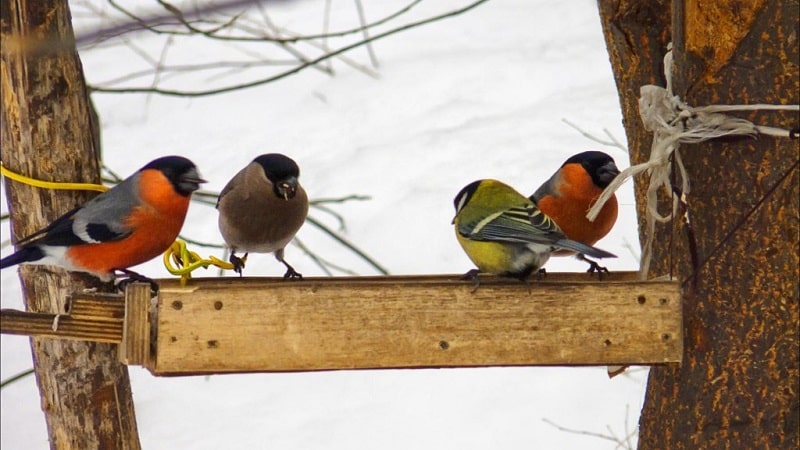
Sample “healthy eating menu” for street birds:
- Lard (visceral fat). It must be raw, and in no case smoked, salted or peppered. Raw lard helps birds stay full for a long time due to its caloric and nutritional content. It is not necessary to chop it, just hang a piece by a wire. Then it will be convenient for the birds to sit on it and peck in small portions.
- Coconut and unsalted butter are very good food for insectivorous birds (great tits, nuthatches, blue tits, blackbirds, etc.). You can add a mixture of various grains and seeds to butter, freeze it, make a hole in the prepared form and thread it through a rope.
- Dried berries of red and black rowan, serviceberry, elderberry, hawthorn, blueberry, etc.
- Dried fruits (apples, pears). They are popular with starlings, waxwings and thrushes.
- Unroasted melon, watermelon, and pumpkin seeds.
- Woodpeckers and nuthatches prefer chopped nuts (walnuts, peanuts).
- Lightly salted cheese, cut into small cubes.
- Dry crumbs of white bread are a real treat for sparrows.
- Ready-made mixtures for birds from the pet store.
What should not be given as food
Birds are prohibited from feeding spoiled food supplies that have fermented and are covered with mold. But there are also a number of restrictions that apply to products familiar to humans. They can cause irreparable damage to the health of birds and even threaten their lives:
- Salted seeds, pistachios, cookies, crackers. Birds do not have sweat glands.The entire burden of removing excess salt from the body falls on the kidneys, so they may refuse heavily salted food. The musculoskeletal system also suffers, because some salts tend to be deposited in the joints. Then any movement of the bird will cause severe pain.
- Roasted nuts. This is where fats can cause harm to the body. When oversaturated with them, the organs of the digestive system (pancreas, liver) suffer.
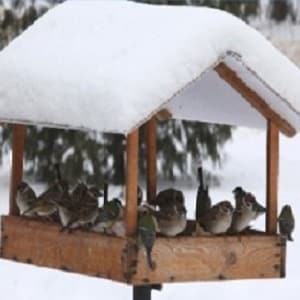 Rye bread. Due to the accelerated fermentation process, a situation often arises when the bird is blocked from breathing due to gases. This happens because the goiter begins to compress the trachea.
Rye bread. Due to the accelerated fermentation process, a situation often arises when the bird is blocked from breathing due to gases. This happens because the goiter begins to compress the trachea.- Fresh wheat bread. It is dangerous because in a humid environment it turns into a sticky substance. It has difficulty moving through the digestive tract and causes indigestion.
- Seed kernels cherries, peach, apricot, and almonds. They are easy to poison because they are rich in hydrocyanic acid.
- Old, rancid millet. Harmful fats accumulate on its surface.
- Potato. The alkaloid solanine, which is found in raw tubers, causes poisoning in birds. The high concentration of starch in boiled potatoes creates an unwanted burden on the stomach.
- Mushrooms. When consuming mushrooms, there is a high probability that spores of clostridia, the causative agent of botulism, will enter the bird’s body.
- Canned food. When preserving foods, sugar, salt, and vinegar are used that are harmful to poultry health.
Interesting things on the site:
General rules for complementary feeding
Once you start feeding birds, make it a habit. Regularly delight them with healthy treats. Birds quickly remember the place of feeding and get used to it. Don't forget: we are responsible for those we have tamed!
Important! The more varied you organize your menu, the more species of birds will be interested in your feeder.
From time to time, empty the feeder of leftover food. Rot and mold are fertile ground for the development of harmful microorganisms.
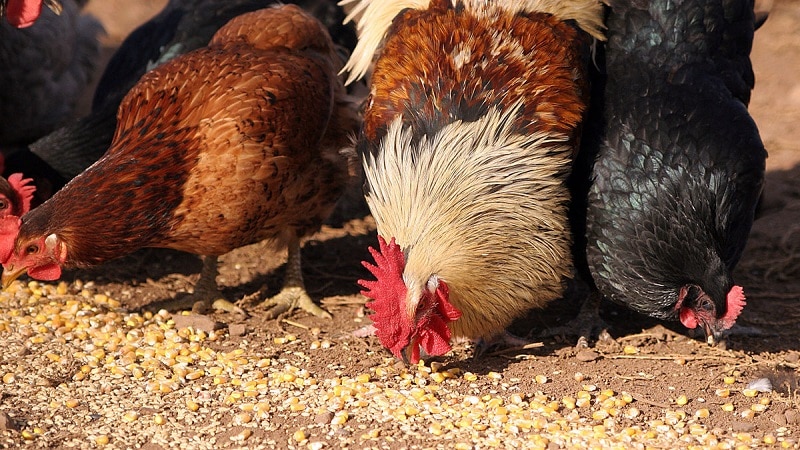
Is it possible to feed rice to poultry?
Most inexperienced farmers are interested in whether it is possible to add rice to bird feed. It seems that it is the same grain as barley, wheat and others. A limited amount of rice, rich in carbohydrates, minerals and B vitamins, will not harm the bird and will have time to be absorbed. However Abuse of this cereal can cause paralysis and even death in chickens.
It is recommended to feed rice to birds during the daytime.. Mix it, for example, with vegetables, grass or other feed.
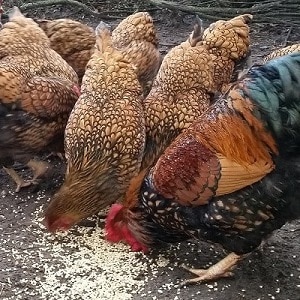 Occasionally feed the birds with boiled rice diluted with milk. Chickens especially love this delicacy. They quickly get full and become energetic.
Occasionally feed the birds with boiled rice diluted with milk. Chickens especially love this delicacy. They quickly get full and become energetic.
It is beneficial to feed birds rice flour and chaff.:
- Mix rice (preferably unpolished) and other food in a ratio of 1:3.
- Dilute a little with water or milk.
Feeding rice alone or its frequent use is unacceptable. The productivity and well-being of a bird depends on the diversity of its diet.
Why do we give rice to fighting birds?
A special diet is being developed specifically for fighting cock breeds., since their body needs an increased rate of protein and vitamins. It is based on mixed feed. There are all kinds of additions to it: dairy products, herbs and even meat. Rice cereal is also added.
Due to the high content of vegetable protein, rice stimulates muscle growth and saturates the body with energy.Another of his merits is strengthening the skeletal system.
Read also:
Conclusion
Helping our feathered comrades is a noble cause. However, it is important to approach it wisely. By understanding the intricacies of the diet of domestic and wild birds, you can easily raise a healthy flock and help wild birds survive difficult times.